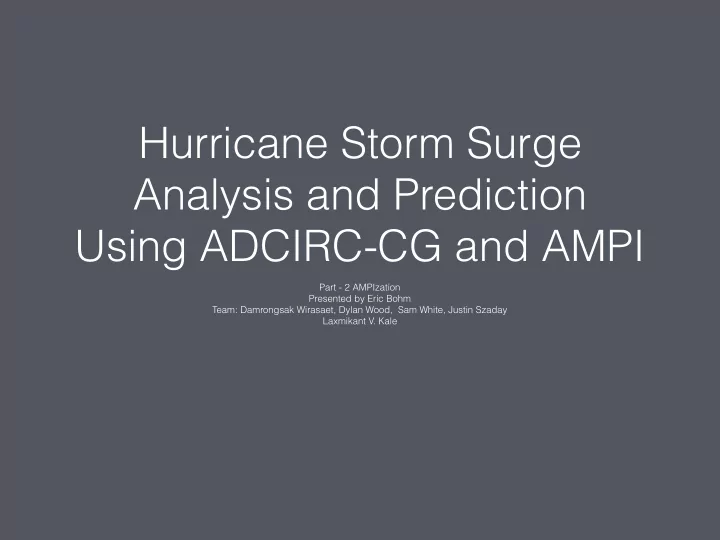

Hurricane Storm Surge Analysis and Prediction Using ADCIRC-CG and AMPI Part - 2 AMPIzation Presented by Eric Bohm Team: Damrongsak Wirasaet, Dylan Wood, Sam White, Justin Szaday Laxmikant V. Kale
ADCIRC-CG • ADCIRC-CG : FORTRAN based MPI code • > 100k SLOC • Wet cells <- real physics computation • Mostly 2d with relatively fine granularity • Dry cells <- bookkeeping, is water here yet? • Dynamic load imbalance emergent from the simulation
AMPI • Each AMPI Ranks run in a user level thread • Breaks the Rank <=> Process assumption • Supports migratability and therefore load balancing • Process global mutable state is a correctness issue • Mostly equivalent to privatizing global state to be specific to the user level thread • AMPI supports a variety of solutions
TLS Privatization • Thread local storage is supported in FORTRAN • -fopenmp • Can also be leveraged by Charm++ user level threads • Supports virtual AMPI ranks • Add -tlsglobals to ampiCC compile line • Add !$omp threadprivate(YourVariable) • For each variable declaration
TLS in FORTAN • Over 2,000 module variables in ADCIRC-CG • Motivating an automatic transformation approach • Fortran global state has several complications • Variables declared at the Module level are global <- TLS • Variables declared with Parameter attribute are constant and cannot be thread local • Variables declared in a subroutine with Save attribute have global extent <- TLS • Variables declared in a subroutine with an initial value are implicitly Save <- TLS • Variables declared in a subroutine are otherwise local • Common blocks promote variables listed therein to global • The common block needs TLS • the variables within the common block do not.
FORTRAN I/O • FORTRAN I/O assigns the Logical Unit Number (LUN) in every IO statement. • Roughly equivalent to a stream or file identifier, the LUN is global to the FORTRAN runtime. • Therefore, each virtual rank performing file operations must have its own LUN • Code transform must alter each I/O operation to add a virtual rank offset to every LUN • e.g., WRITE(UNIT=APPLUN, …) • -> WRITE(UNIT=APPLUN+CK_LUN,…) • Must NOT transform when the LUN variable is not an INTEGER • FORTRAN I/O commands may also be used to operate on “Internal” data. • String operations that look like file operations • Must NOT transform operations that merely resemble file operations
(Semi) Automatic FORTRAN AMPIzation • FLANG was not (still not) at a level where it could support these • Actual transformation are relatively simple • Perl implementation using REGEX based parsing of FORTRAN variable declarations and I/O statements • Adds thread private only where necessary • LUN privatization module • Insert an import of ck_lun to each module with FORTRAN I/O • Arithmetically add ck_lun to each fortran I/O statement LUN • Unless that LUN is not an integer • Detect that based on extracting variable type by module so the type of each LUN in scope can be determined • Need to close and reopen open LUNs when a rank is migrated out of the process • Required manual implementation by Damrongsak Wirasaet <dwirasae@nd.edu>
LUN Migration • Implement about_to_migrate callback • Record each open file and its LUN data • Close each open file • Implement just_migrated callback • Reopen each file, restore LUN data • Register callbacks with • AMPI_REGISTER_ABOUT_TO_MIGRATE AMPI_REGISTER_JUST_MIGRATED • These will be triggered automatically when a virtual rank migrates
ADCIRC Status • Runs in AMPI on SMP and non-SMP • Initial port ran into a hang bug when virtualization ratio > 1 OR PPN >1 • Symptom was MPI_WAITSOME returns MPI_UNDEFINED (-32768) in the count of completed receives. • Further study indicated a bug in the AMPI implementation of MPI_WAITSOME • Fixed by Sam White • Virtualization supported, dynamic load balancing demonstrated • Instability in long runs • NetCDF input not currently supported • Virtualization negatively impacts performance • MPI_All_Reduce performance on sub-communicators has excessive overhead in the current AMPI implementation
Future Work • Implement transforms in FLANG - Justin • Metabalancer integration to trigger balancing when necessary • AMPI improvements to sub-communicator collective performance - Sam • Adapt application specific balancing hints • Sort by elevation, etc. - Dylan • Experiment with graph partitioning based balancers
Recommend
More recommend